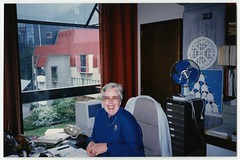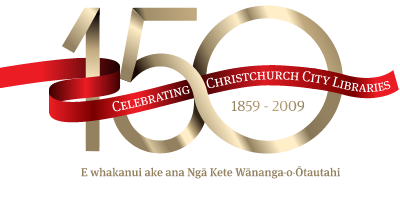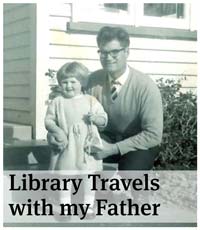Dorothea Brown (1938- )
Dorothea Brown was appointed City Librarian in July 1986. She was a ground-breaker - the first woman to be appointed City Librarian in Christchurch and the first woman to head a Christchurch City Council department.
She presided over a challenging time in the library’s existence including rapid technological change, the challenge of “user pays”, local government reorganisation and huge growth in the library’s business.
Early days
Dorothea was born in The Hague in Holland in 1938. During the war her family moved to Utrecht were she went to a local gymnasium (grammar school) which offered a rigorous course of languages including Latin and Greek, history and mathematics which was designed to prepare students for University. At the end of her high school years she achieved the equivalent to university entrance.
Her family could not afford to support her at university so she was faced with the choice of either office work or emigrating to New Zealand. She says “New Zealand sounded more fun”.
After a long sea voyage she arrived in Christchurch in 1957. She had a married sister living in Christchurch who arranged Dorothea’s first job in New Zealand at a soil testing laboratory. She was laid off after a few months and approached Vocational Guidance. They suggested that with her background in languages she might enjoy library work so she went on the waiting list for a position at Canterbury Public Library. In the meantime she worked as the vegetable cook at the well known Coffee Pot restaurant in New Regent Street.
Building A Library Career
In May 1958 she was successful in gaining a job at Canterbury Public Library. After five years she was a senior library assistant and had completed the New Zealand Library Certificate. She married Ed Brown, a Scotsman, and in 1961 the two of them travelled overseas to visit their home countries.
Returning to Christchurch she worked as a shop assistant at Mrs Pope’s before gaining a job as a cataloguer at the University of Canterbury library, where she worked for about five years. This was followed by a year working at Massey University.
Her next move was to Invercargill where she worked for three years at New Zealand Aluminium Smelters as their only librarian. This gave her a degree of independence and experience in the reference work of a special library. She came back to Christchurch and the University of Canterbury where she worked in acquisitions.
Waimairi District Libraries
In 1976 Dorothea was appointed Waimairi District Librarian. The Bishopdale Library had just been built but had not yet opened. While still working out her notice at the university library she had to interview and appoint staff for the new library. She had nine years working for the Waimairi District Council and found, especially after her university experience, that it was a relatively small and innovative organisation to work for. It also gave her the experience of working with politicians. She began to regularly attend council meetings. In this job she was responsible for the Fendalton, Redwood and Bishopdale Libraries and a mobile library.
Involvement in the Library profession
During her second time of employment at the University of Canterbury Librar, Dorothea became very active in the local branch of the New Zealand Library Association. This was followed during her Waimairi years with involvement at the national level of the organisation becoming president in 1982.
Back to Christchurch City Libraries
In 1985 the position of Deputy City Librarian became available when Helen Tait was appointed Auckland City Librarian. It seemed the right time to move – local government amalgamation was on the cards and John Stringleman was approaching retirement. It was an opportunity and a risk. She found John Stringleman a great help, willing to share his knowledge and experience.
During her time as deputy she gained experience in dealing with the library committee and working on the annual budget and became involved in the process of installing the new automated library system called ATLAS which became operational in mid November 1986. Her appointment as City Librarian was preceded by an interview with the library committee.
City Librarian
 Dorothea took up her role as City Librarian in 1986. Among the big issues that she had to deal with was the threat of user pays and the incorporation of libraries from Paparua County and Waimairi District into the network following local government amalgamation in 1989. With amalgamation customers would have access to libraries across the whole city and staff worked incredibly hard to achieve the goal of making the whole network available for any customer who customer walked into a former Waimairi District library on 1 November 1989.
Dorothea took up her role as City Librarian in 1986. Among the big issues that she had to deal with was the threat of user pays and the incorporation of libraries from Paparua County and Waimairi District into the network following local government amalgamation in 1989. With amalgamation customers would have access to libraries across the whole city and staff worked incredibly hard to achieve the goal of making the whole network available for any customer who customer walked into a former Waimairi District library on 1 November 1989.
The end of the “old” Canterbury Public Library was celebrated by a party on the last evening and the following morning all the new teams celebrated with a special breakfast in the Central Library.
The new council was also keen to review spending on the library system and commissioned a report from accounting firm KPMG. The library was required to provide information for the consultants but had no other input into the initial report which recommended that the library could make up to a million dollars in savings. Dorothea and her team at the library disagreed so strongly with many of the conclusions from the report that she refused to support the report and instead she tabled a dissenting report making the case that savings of that magnitude could only be made by making up to 30 staff redundant and that some of the figures quoted and assumptions made by KPMG were not correct.
In the end the report was not implemented at that time but the following year the Christchurch City Council’s budget review committee proposed to cut $800,000 from the libraries’ budget. The Friends of the Library mounted a petition against the cuts and a steady stream of letters appeared in the paper in support of the libraries. The result was an outpouring of public support – nearly 7000 signatures on the petition and more that 50 per cent of all submissions to the Council were about the cuts to the library budget.
The council reinstated some of the funding for the book vote although the library reluctantly had to increase some charges.
Strategic planning
The post- amalgamation period was a time of rapid growth in demand for library services as the library inherited not only Waimairi and Paparua districts which had provided library services but Heathcote and Riccarton Borough which had not. Staff in the newly amalgamated libraries were struggling to keep up with demand, leading to major problems with occupational overuse injuries.
Requests for extra staff were not looked on favourably as amalgamation had been expected to create savings. Dorothea recalled her life being consumed by budgets. She described her experience at Waimairi as good preparation, as she had always had to be prepared to justify even the smallest and most obscure item in a budget.
Post amalgamation the mayor and councillors and the senior management group held a t wo-day retreat at Methven. Most unit managers were not invited but Dorothea was one who did attend. The group created a prioritised wishlist of new projects to celebrate the new city. Shortly after this she received an urgent message from the mayor, Vicki Buck, about new things happening in the suburbs. She saw this as a golden opportunity to get Linwood Library off the ground and then do a revision of John Stringleman’s original plan for the gradual establishment of branches.
Her vision was that the library strategic plan should include a number of large libraries across the city taking advantage of the fact that as a flat city it was easy to get about.
A trip to some of the most innovative libraries in the United States, undertaken in 1990 also provided ideas for future development.
Moving on
In 1994 Dorothea was seconded to work on a major organisational development project for the council. A council wide survey showed the library in a very favourable light and led to Dorothea and fellow manager Joe McCarthy spending a year coming up with recommendations on how the council could improve its standards of work and service.
This lead to council management giving Human Resources a more prominent role in the organisational structure. The position of Director of Human Resources was created and Dorothea was successful in her application. She held this position for the next nine years, retiring in 2003.
Reviewing her career Dorothea said the greatest thing was discovering librarianship as her vocation. She acknowledged the support and mentoring she received from John Stringleman, Shirley Shea, Jean Wright, and Brian Gilberthorpe. She saw it as always being about sharing information.
“What I loved about the public library idea and what I needed to come to New Zealand to learn was the concept of contributing to democracy and contributing to learning for everyone,” she said.
In her time on the circulation desk she discovered “you never judge a person by their appearances and that everyone has an interesting story in their life.” She loved that libraries were so “populist and such a leveller” and she also enjoyed the great people she worked with in the profession.
Dorothea has always been and remains a passionate reader and purchaser of books with a special interest in history, but always looking to explore new areas. She describes herself as a serendipitous reader and a continuous learner.
Sources
Interview with Dorothea Brown, 9 July, 2009.



